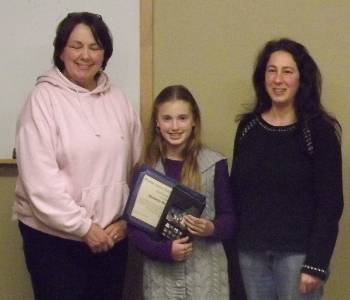|
The 2013 Rhody Warm
HANTON CITY COLLECTION
from our Lost Village Series
|
|
|
|
|
|
Roberta Mulholland, RI Sheep Co-op Director, Melanie Nelson, Essay Contest Winner, and Jenny Paquet,
RI Sheep Co-op Secretary
|
|
|
Just imagine a time when there were no cars or highways and people travelled around on horses or by foot. The lost city of Hanton sits in
what we know today as the Town of Smithfield, Rhode Island.
The history of Hanton City was first investigated in 1889 when a
reporter from the Providence Journal ventured into the area and came across a small house located on the outskirts of a village that was
called Hanton City. (Providence Journal Article, titled "A Buried City" October 6, 1889). The reporter met with Thomas Hanton and his sister,
who were known to be the "last of the Hantons." Mr. Hanton was believed to be 80 years old at the time of this interview. He told the reporter that the residents of Hanton City were poor people, who were
paid with food not money for their goods and services. It was reported that Hanton City was originally settled by three families with the surnames of Paine, Henended and Shepey (also known as: Paine,
Hanton and Shippee).
The remains of Hanton City showed evidence of the land being farmed
at one point. They had irrigation systems in place and old corn cribs. Besides being boot makers (making boots from leather) and tanners
(making leather from animal hides), the men also quarried big blocks of granite used in the making of several building foundations located in
Providence, Rhode Island. The granite was cut by hand using the pin and feather method. When Mr. Hanton was asked what
happened to the people of Hanton City, he replied, "They all got poor and sold out to anybody and died off." This statement
indicates that the residents were not wiped out by a plague, natural disaster, nor had their land taken away, as is sometimes
reported in more modern times. It appears that Hanton City was abandoned by most of its residents around 1830. Sad to think
that what was once a small flourishing settlement is just remnants of foundations, stonewalls, a dam and a few gravestones
with the names of Alfred, Eliza and Emor Smith. The land of Hanton City is now owned by the Dow Chemical Company.
Congratulations to Melanie Rose Nelson, 11, of West Warwick, who wrote the winning essay for which the 2013 edition
of the Rhody Warm Blankets is named. The narrative above is based on her research and her essay on Hanton City.
|

